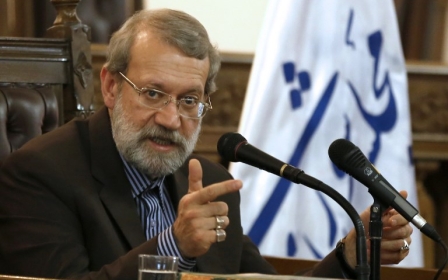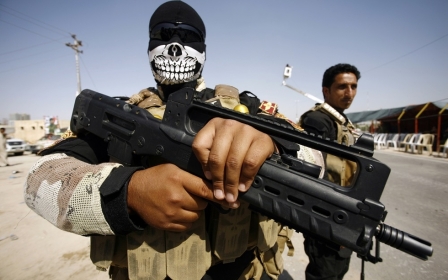Iraqi cleric Muqtada al-Sadr makes rare visit to Saudi Arabia

Influential Shia cleric Muqtada al-Sadr visited Saudi Arabia on Sunday in a rare trip to the Kingdom.
Sadr was seen greeting Thamer al-Sabhan, Saudi's former ambassador to Iraq, who was replaced in February after criticising the Shia-dominated Popular Mobilisation Units (PMUs).
"His Eminence Sayyed Muqtada al-Sadr, may God have mercy on him, goes to visit Saudi Arabia at an official invitation," said his office in a statement ahead of the visit.
Little information has been publicly given about the reasons for the trip, which Sadr's office described as his first in 11 years.
A fierce Iraqi nationalist, Sadr has recently been highly critical of the influence of Saudi's regional rival Iran over its influence in Iraq and neighbouring Syria.
In April he broke with other Shia leaders in the Middle East in calling for Syria's ruler Bashar al-Assad to step down.
"I would consider it fair for President Bashar al-Assad to resign and leave power, allowing the dear people of Syria to avoid the scourge of war and terrorist oppression," he said in a statement.
Iran has been Assad's staunchest backer in the region and numerous Iraqi PMU fighters have travelled to Syria to combat the Islamic State (IS) group and opposition groups seeking Assad's overthrow.
In April, Sadr told Middle East Eye that "sectarian" PMUs have no place in Iraq.
Speaking from his home in Najaf, he told MEE that he favoured urgent dialogue with Iraq's Sunni politicians so as to prevent sectarian clashes once the country no longer has a common enemy in IS.
"I'm afraid that the defeat of Daesh [Islamic State] is only the start of a new phase. My proposal is inspired by fear of sectarian and ethnic conflict after Mosul's liberation," he said.
"I want to avoid this. I am very proud of Iraq's diversity but my fear is that we may see a genocide of some ethnic or sectarian groups."
Relations between Saudi Arabia and Iraq were severed after Saddam Hussein's invasion of Kuwait in 1990 and were only re-established in 2015.
Last month, Iraq's prime minister Haider al-Abadi met King Salman in Saudi Arabia in a bid to strengthen ties between the two countries.
"The countries agreed to establish a coordination council to upgrade relations to the hoped for strategic level and open new horizons for cooperation in different fields," said the statement carried by the official Saudi Press Agency.
It said the two countries had achieved a "quantum leap" in bilateral relations and stressed the importance of further official visits.
Iraq has been keen not to be seen as taking a side in the dispute between Saudi Arabia and Qatar, which has seen a number of Arab states blockading the country.
However, others have suggested that Iraq and Qatar have grown closer since the crisis hit.
The foreign minister of Qatar, Sheikh Mohammed bin Abdulrahman al-Thani, visited Iraq in May, and promised that Qatar would open an embassy in Baghdad in the near future.
Middle East Eye propose une couverture et une analyse indépendantes et incomparables du Moyen-Orient, de l’Afrique du Nord et d’autres régions du monde. Pour en savoir plus sur la reprise de ce contenu et les frais qui s’appliquent, veuillez remplir ce formulaire [en anglais]. Pour en savoir plus sur MEE, cliquez ici [en anglais].




